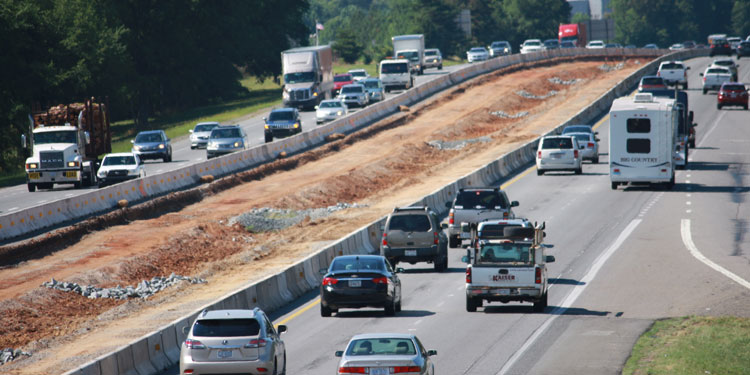
Jan. 26. By Dave Vieser. The long-awaited inaugural meeting of the I-77 advisory committee was held this week behind closed doors at the Lake Norman Chamber of Commerce in Cornelius. Neither the media nor the general public was allowed to enter.
Chamber CEO Bill Russell decided to close the meeting.
“After much consideration we decided that closing the first meeting would be the best way to have our participants speak freely without having people or cameras hanging over their shoulder.” Russell also indicated that while he advised DOT staff that he recommended it be a closed meeting, they did not request that it be closed.
Former Gov. Pat McCrory fumed. “That’s not right,” he said on his radio show. “The head of the chamber…other people need to hear what he has to say, and what other electeds have to say,” McCrory said, explaining that the new head of the NCDOT, Jim Trogdon, was the “architect” of the I-77 toll concept.
“I didnt know he had that right to do that It’s an amazing power for the head of the lkn chamber to shut the doors on the public,” McCrory said, perhaps licking his own wounds around losing the Lake Norman vote in 2016. “Why hasn’t the contract been cancelled?” Gov. Roy Cooper, a Democrat, has come nowhere close to cancelling the contract with Cintra either.
But the Advisory Board—or Group—looked like a step toward clarity and open discussion. North Carolina has an Open Meetings Law. It states:
Whereas the public bodies that administer the legislative, policy-making, quasi-judicial, administrative, and advisory functions of North Carolina and its political subdivisions exist solely to conduct the people’s business, it is the public policy of North Carolina that the hearings, deliberations, and actions of these bodies be conducted openly.
Of course the debate swirling around the chamber centers on whether the board, downgraded to a “group”—qualifies under the Open Meetings Law which governs the meetings of “public bodies.”
State law says that meetings of public bodies should be open to the public, though they are permitted to remove the public and the press and reconvene into an executive session for a number of reasons, including personnel matters and potential litigation. In such instances, the board must come back after the executive session and announce any decisions or actions taken behind closed doors.
Key players were not happy with Russell’s decision to close the meeting.
“Having been on the outside of a number of closed I-77 meetings, I certainly understand the frustration,” said Cornelius Commissioner Kurt Naas, the original anti-toll leader.
“The meeting was held at the LKN Chamber and as a private entity it was their prerogative to close the meeting, which they exercised. Not sure I agree with any of that but those are the ground rules.” The board/group does not possess any power per se, and will apparently function in an advisory capacity.
Others from the I-77 anti-toll movement were even more critical of the process.
“Any representation that this is a true citizen’s advisory board by any stretch of the imagination is inaccurate at best,” said Michelle Ferlauto, an unsuccessful candidate for the Cornelius Town Board.
“The electeds in attendance should have known and advocated on behalf of the public,” she said.
Naas said it was essentially an introductory meeting. “We received an overview of the project, as well as the Mercator report. The DOT sent a pretty impressive posse, including Secretary of Transportation James Trogdon, NCTA Director Beau Memory and NCDOT Chief Engineer Rodger Rochelle.”
Naas said the initial expectation is that the committee will be concluding their itinerary after six meetings, which would be sometime in late April.
“Bottom line is for the committee to have a thorough and detailed discussion with the goal of bringing additional general I-77 purpose lanes to the Lake Norman area,” Russell said.




